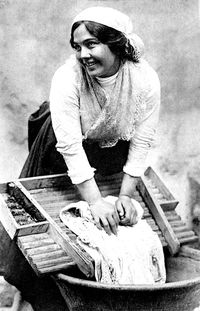Washerwoman
A washerwoman or laundress is a woman who takes in laundry. Both terms are now old-fashioned.
Description
As evidenced by the character of Nausicaa in the Odyssey, in the social conventions depicted by Homer and evidently taken for granted in Greek society of the time, there was nothing unusual or demeaning in a princess and her handmaidens personally washing laundry. However, in later times this was mostly considered as the work of women of low social status. The Magdalene asylums chose laundering as a suitable occupation for the "fallen women" they accommodated.
In between these two extremes, the various sub-divisions of laundry workers in 19th-century France (blanchisseuse, lavandière, laveuse, buandière, repasseuse, etc.) were respected for their trade. A festival in their honour was held at the end of winter (Mi-Careme, halfway through Lent, i.e. three weeks after Mardi Gras or Shrove Tuesday). This festival has now been revived as Mi-Carême au Carnaval de Paris.
The wet nurse to George III of the United Kingdom, who was born two months prematurely, was so valued by the king when he grew up that her daughter was appointed laundress to the Royal Household, "a sinecure place of great emolument".
While having a significant social function in various human cultures over thousands of years, the spread of washing machines and self-service laundries have rendered washerwomen unnecessary in much of the contemporary world.
- More information is available at [ Wikipedia:Washerwoman ]
|
Chat rooms • What links here • Copyright info • Contact information • Category:Root
